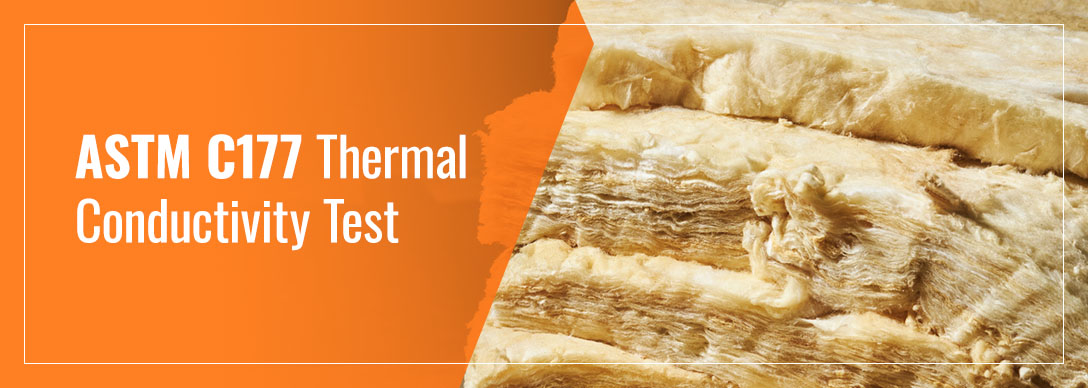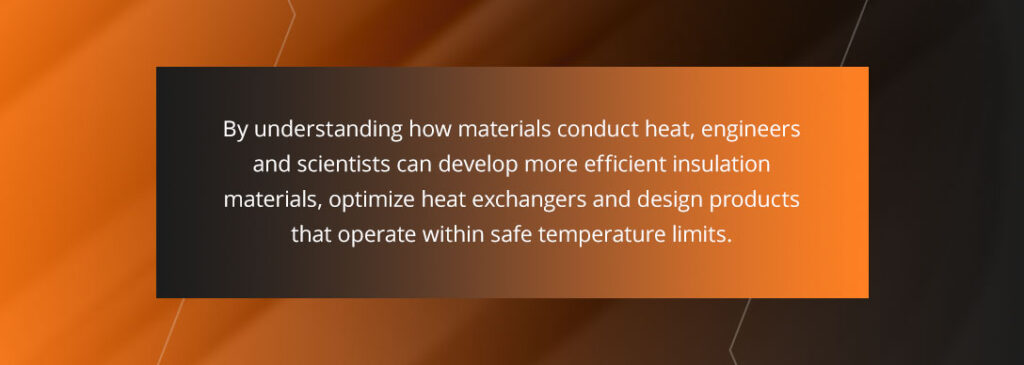ASTM C177 Thermal Conductivity Test
ASTM C177 is the standard test for measuring a material's thermal conductivity using a guarded-hot-plate instrument. To qualify as a thermal insulator, a material must demonstrate low thermal conductivity in this test.

Our ASTM C177 Thermal Conductivity Testing Method
This method measures steady-state heat transfer across homogeneous flat specimens by exposing parallel surfaces to a controlled heat source under laboratory conditions, allowing for repeatable results.
Accurate testing requires strict control of many factors such as environmental conditions, equipment calibration, and specimen mounting. In addition, the professionals conducting the test must be experienced in thermal analysis, data collection, and thermal conductivity measurement.
If ASTM C177 testers do not possess thorough technical knowledge of heat flow and transfer or these conditions aren’t met, any thermal conductivity test results are questionable at best.
At VTEC Laboratories, we’ve been providing high-quality thermal conductivity analysis and testing to a broad range of sectors — including manufacturing, aerospace, plastics, chemical, transportation, electronics, military, and more — for well over four decades.
The Importance of ASTM C177 Thermal Conductivity Testing
This test, established by the American Society for Testing and Materials (ASTM), determines the steady-state heat flux and temperature differences across flat slab specimens. It evaluates the thermal insulation properties of materials under specific conditions, offering valuable insight into their performance in terms of heat transfer.
This is the ideal materials test to accurately measure the heat flux of a pair of flat identical specimens mounted on each side of the guarded-hot-plate instrument.
This thermal conductivity testing method gauges the rate of heat flow through the specimens, factoring in their total thickness and temperature gradient across that thickness.
Information gathered from the ASTM C177 test contributes to innovation. By understanding how materials conduct heat, engineers and scientists can develop more efficient insulation materials, optimize heat exchangers, and design products that operate within safe temperature limits.
Proper testing allows your operation to create materials that work precisely as needed to promote safety, efficiency and productivity.
Thermal Conductivity Testing Applications
Thermal conductivity measurements determine how efficiently a material conducts heat. A higher value indicates effective heat transfer, while a lower value suggests insulating properties.
ASTM C177 tests are essential for energy efficiency, insulation design, and material selection across industries.
Examples
- Electronics - These tests help prevent overheating and help manufacturers choose the appropriate materials for products.
- Construction - Energy-efficient buildings can be designed based on knowledge about thermal conductivity in construction materials.
They also drive innovations in aerospace, automotive, and manufacturing.
By analyzing heat transfer, thermal conductivity testing helps engineers and scientists optimize materials, improve technology, and enhance energy conservation.
Thermal Conductivity Testing Measurements
The test extends to a wide range of materials, including thermal insulators, construction materials, textiles, foams, and composites. It quantifies thermal conductivity by subjecting these materials to controlled temperature gradients. This information is essential for industries where efficient thermal insulation and management are paramount.
For an accurate ASTM C177 test, both specimens must be identical in thickness, density, and shape. Any deviations from the specimens’ homogeneity and similarity can interfere with the flow of heat, which alters the temperatures that various measuring devices and thermocouples read.
The thermal conductivity measurement involves placing two specimens on either side of a guarded hot-plate instrument. In this arrangement, guard — or auxiliary — heaters minimize the transfer of lateral heat from the main heater — or the hot plate — and help concentrate heat flow at the subjects that are mounted parallel outside the main heater.
The total heat transferred to the specimens during the ASTM C177 test equals the supplied power to the hot plate. Equilibrium occurs when voltage and temperature readings become steady.
VTEC Is Your Certified Thermal Conductivity Testing Lab
As an A2LA and ISO-accredited laboratory, we’re always prepared to conduct standardized testing to meet the strictest requirements of most governing bodies such as Underwriters Laboratories (UL), the International Standards Organization (ISO), and, of course, the ASTM — especially as it applies to ASTM C177.
With an ISO 17020, 17025 and 17065 accredited lab, we deliver results that go above and beyond industry standards in quality, accuracy, and speed. In addition, we’re also happy to meet all of your customized testing needs including the designing, building, and installation of custom-made test apparatus.
Get a Free Quote
VTEC’s thermal conductivity measurements evaluate your materials' heat transfer properties, helping you make informed decisions and drive innovation.
Investing in customized testing delivers the accurate, tailored results you need to optimize your operation. With an average turnaround time of two weeks, you'll get results at an unmatched speed. Need expedited testing? Contact our expert team for customized solutions.
For more information regarding our ASTM C177 testing services, fill out our contact form or call us at 718-542-8248.
Along With ASTM C177 Thermal Conductivity Testing, Customers Also Requested:
Ask About Our Expert Testing Services
At VTEC Laboratories, our role as a multi-functional company stems from our more than three decades of experience. Due to our extensive expertise in multiple industries, we provide comprehensive services that meet each field’s unique standards, needs, and objectives.
Learn more about our services by contacting us online or calling us at (718) 542-8248.


